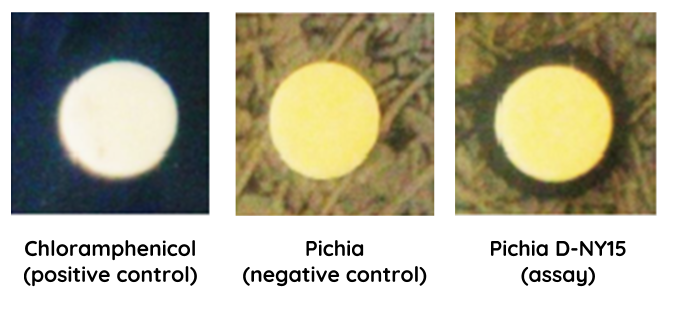Difference between revisions of "Part:BBa K1800001"
(→Team INSA-UPS France 2017: usage of BBa_K1800001 in Pichia pastoris strain to secrete antimicrobial peptides) |
|||
| (5 intermediate revisions by the same user not shown) | |||
| Line 19: | Line 19: | ||
==Team INSA-UPS France 2017: usage of BBa_K1800001 in <i>Pichia pastoris</i> strain to secrete antimicrobial peptides== | ==Team INSA-UPS France 2017: usage of BBa_K1800001 in <i>Pichia pastoris</i> strain to secrete antimicrobial peptides== | ||
| − | |||
| − | We fusionnate the alpha secretion factor with an antimicrobial peptide (AMP). The construction was put under the control of a pGAP promoter | + | We fusionnate the alpha secretion factor with an antimicrobial peptide (AMP). The construction was put under the control of a pGAP promoter (<partinfo>BBa_K431009</partinfo>). |
| − | < | + | The construction was cloned in pPICZalpha vector and has been integrated in <i>Pichia pastoris</i> thanks to pAOXI (<partinfo>BBa_K431007</partinfo>) genomic homology region. |
| − | + | The functionality of the signal factor was investigated by demonstrating that AMP are present in the supernatant through a toxicity assay. The engineered yeast was used in a halo assay against <i>V. harveyi</i> as the target of AMPs. A paper soacked with a yeast supernantant solution was placed on the plate and <i>V. harveyi</i> growth in the viscinity of the yeast patch was followed: | |
| − | + | ||
| − | + | ||
| − | < | + | [[Image:T--INSA-UPS_France--HalosPichia.png|800px|thumb|center|<b>AMP halo assay:</b> Positive control was performed with chloramphenicol (25 g/L), the negative control was performed with the empty plasmid integrated in <i>P. pastoris</i>, the assay was performed using the plasmid containing ( <partinfo>BBa_K2278021</partinfo>) driving D-NY15 secretion integrated in <i>P. pastoris</i>. ]] |
| − | |||
| − | |||
| − | + | We can observe a significant inhibition halo meaning that the AMP have been secreted thanks to the alpha factor. | |
| − | + | ||
Latest revision as of 20:50, 23 October 2017
Alpha-Factor Secretion Signal
The factor secretion signal is a N-terminal secretion signal from S. cerevisiae alpha factor intended to be used to create fusion proteins
Sequence and Features
- 10COMPATIBLE WITH RFC[10]
- 12COMPATIBLE WITH RFC[12]
- 21INCOMPATIBLE WITH RFC[21]Illegal XhoI site found at 244
- 23COMPATIBLE WITH RFC[23]
- 25COMPATIBLE WITH RFC[25]
- 1000COMPATIBLE WITH RFC[1000]
Team INSA-UPS France 2017: usage of BBa_K1800001 in Pichia pastoris strain to secrete antimicrobial peptides
We fusionnate the alpha secretion factor with an antimicrobial peptide (AMP). The construction was put under the control of a pGAP promoter (BBa_K431009). The construction was cloned in pPICZalpha vector and has been integrated in Pichia pastoris thanks to pAOXI (BBa_K431007) genomic homology region.
The functionality of the signal factor was investigated by demonstrating that AMP are present in the supernatant through a toxicity assay. The engineered yeast was used in a halo assay against V. harveyi as the target of AMPs. A paper soacked with a yeast supernantant solution was placed on the plate and V. harveyi growth in the viscinity of the yeast patch was followed:

We can observe a significant inhibition halo meaning that the AMP have been secreted thanks to the alpha factor.
